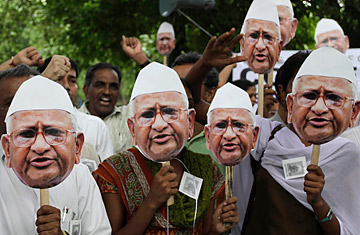
Solidarity
Indians hold cutouts of Hazare during a protest in support of his fight against corruption in Ahmadabad, August 17, 2011.
After 10 days of subsisting on nothing but water, the Indian anti-corruption crusader Anna Hazare said on Thursday evening he was ready to end his fast on the condition that the Indian government would promise, in writing, to include the main points of his agenda in its final draft of a new anti-corruption bill. "I have sent a message to the prime minister," Hazare told thousands of supporters in New Delhi on Thursday evening. "If you want to pass the Jan Lokpal (people's ombudsman) bill then start the discussion Friday morning. I have three demands. If there is support, then I can consider ending the fast." (The debate in Parliament will take place on Saturday with Hazare's fast now entering the twelfth day.)
Prime Minister Manmohan Singh seemed to have gotten the message. He met with Rahul Gandhi, acting head of the Congress Party, on Friday morning. (His mother, Sonia Gandhi, is abroad getting treatment for an undisclosed illness.) Shortly after his meeting with the Prime Minister, Gandhi stepped into the debate, ending a conspicuous silence during this week-long crisis of confidence in his party's government. He thanked Hazare for bringing the issue of corruption to national attention but then questioned whether one law would make a difference. "Witnessing the events of the last few days it would appear that the enactment of a single Bill will usher in a corruption-free society," Gandhi said. "I have serious doubts about this belief."
Until now, the government has appeared confused about whether to take a hard line against Hazare for disrupting the parliamentary process or try to co-opt his demands, adopting them as their own. At one point, a Congress Party spokesman accused Hazare himself of being corrupt. The government also held a series of meetings with Hazare's group this week and an all-party meeting — none of which came to any conclusion. Meanwhile, the government has watched the 74-year-old's failing health and growing public support with alarm. On Thursday, Singh made an emotional appeal to Hazare to call off his fast. "He [Hazare] has become the embodiment of our people's disgust and concern about tackling corruption," he said. "I applaud him, I salute him."
Rahul Gandhi's entry onto the stage in this drama offers a little clarity. Few Congress Party politicians are willing to openly contradict Gandhi, scion of the Nehru-Gandhi family and a likely future prime minister. Gandhi has now made his position public, so it's likely that the government will follow his lead: praise Hazare and empathize with anti-corruption sentiment but insist on the primacy of Parliament. Instead of a completely independent Lokpal, Gandhi proposed an office that would be "accountable to Parliament like the Election Commission" and suggested other reforms, like government funding of elections and reforms to end tax evasion.
This approach — more debate, more laws and more regulation — may not satisfy the thousands of people who see in Hazare's fight their own daily struggles against petty bureaucratic corruption. Kesar Bai, 60, a widow from a remote village in the central Indian state of Madhya Pradesh, said she fasted outside a government office for a month to get her dead husband's pension benefits, which had been denied to her for the last 3 years. She says that she also had to bribe the clerk Rs. 500 ($11) to open an account with the government's flagship rural employment scheme. On Thursday she came down to Delhi along with 500 other people to see Hazare. "When I was fasting there was no one around me," she says. "He must be a very important man. I will ask him to get my pension out."
